Fortunately, there are addiction resources available to help individuals refrain from risky substance use behaviors. Addiction treatment is important for those who suffer from addiction as well as their families. Addiction treatment can help individuals struggling with addiction to achieve sobriety and live a healthy, drug-free life.
There are many different types of addiction resources available in the state of Massachusetts. These different programs and resources provide clinical care, psychological and emotional support, and other essential resources to individuals in need.
Massachusetts Substance Abuse Statistics
- In the state of Massachusetts, 1,211 opioid overdoses were confirmed within the first 9 months of 2021.
- In 2020, 1,937 opioid-related overdose deaths occurred. Among these deaths, fentanyl was detected through toxicology tests in 92% of heroin.
- On average, Massachusetts experiences a 55.07% higher overdose death rate than the rest of the country.
- 73% of all opioid-related deaths in 2020 were among men.
- The presence of cocaine in toxicology reports in Massachusetts had increased from 39% in 2017 to 52% in the second quarter of 2021.
- In 2020, 50% of opioid-related overdoses occurred in people who were between 25 and 44 years of age. 40% occurred in people between the ages of 45 and 64.
The Importance of Addiction Treatment
When an individual is experiencing a substance use disorder (SUD), addiction treatment is vital. Addiction is a progressive disease. This means that over time, it will get worse without treatment. To stop addiction from spiraling out of control, clinical care is needed.
Much like other types of chronic illness, addiction requires medical attention. Addiction is a serious disease that causes changes in the brain. These changes make it hard for people to control their impulses and emotions. Overall, addiction treatment enables people to:
- Abstain from drug or alcohol abuse
- Manage substance cravings
- Develop healthy coping mechanisms
- Build important life skills
- Learn about addiction, including their particular addiction
- Engage in therapeutic interventions
- Gain a support system that understands their needs
In general, when a person tries to stop using drugs on their own, they can easily relapse. This is due to the changes that addiction has caused in the brain. Addiction treatment helps to both address these changes and give people the tools they need to manage their addiction.
Types of Addiction Treatment
Among the most important addiction resources is addiction treatment. There are many different types of addiction treatment available. The most important factor in choosing a treatment is finding one that meets the specific needs of the individual.
Overall, addiction treatment should be tailored to each person’s needs. This is why we take an individualized approach at Chapters Recovery Center. There are many types of addiction treatment available at our treatment center in Danvers, MA. The treatment options available, here at Chapters Recovery include the following programs:

Outpatient Treatment
Patients in our outpatient treatment program will attend treatment for a few days a week, receiving clinical care during the day. While in treatment, our patients engage in various forms of evidence-based treatment. After the day is complete, patients can practice their newfound skills at home with their family or support network.
Intensive Outpatient Treatment (IOP)
Intensive outpatient treatment programs typically meet 3-5 days per week for several hours each day. The program offers all of the same services and clinical care that a traditional outpatient program offers, but with an increased amount of time spent in the facility. While some people may benefit from an IOP as a stand-alone program, others may find that moving through outpatient levels of care works better for their needs.
Day Treatment Program
This option is an excellent starting point for patients who require intensive care yet still want the flexibility of an outpatient program. Equally, a Day Treatment program is a good transition from a preceding inpatient care program. Rather than completing treatment and immediately returning to everyday life, individuals with a SUD can simply step down to this level of care to ease into everyday life.

Addiction Resources Offered in Treatment Programs
Within a treatment program, there are many addiction resources available. This includes access to different types of therapy, support groups, alumni programs, or even sober living arrangements. Here at Chapters Recovery Center, we offer many addiction resources and therapeutic approaches to aid you with your journey to sobriety. Some of the resources that may be beneficial to you include:
- Cognitive-behavioral therapy (CBT)
- Dialectical behavioral therapy (DBT)
- Family therapy
- Group therapy
- Individual therapy
- 12-Step therapy
- Aftercare program
These programs and therapies aim to resolve the many contributing factors that lead to addiction. Our addiction resources are here to help you overcome your addiction and achieve long-term recovery. If you or a loved one is struggling with addiction, please reach out to us. We can offer you the necessary resources to help you on your road to recovery.
Break the Cycle With Chapters Recovery Center
Addiction is a serious problem that many people suffer from. It can be hard to overcome addiction without the help of a treatment program. If you or someone you know is struggling with addiction, reach out to us at Chapters Recovery Center today. We can provide the addiction resources you or your loved one needs to overcome this serious condition.
Key Components of a Relapse Prevention Plan
Like other chronic diseases such as heart disease or asthma, treatment for drug addiction usually isn’t a cure. But addiction can be managed successfully. Treatment enables people to counteract addiction’s disruptive effects on their brain and behavior and regain control of their lives.
Substance Abuse and Domestic Violence
Domestic violence is held to be one of the main reasons for a large percentage of home-related injuries and abuse. In the US alone, it is estimated that at least 10 million people will be affected by one form of domestic violence or another.
The Cycle of Addiction: 6 Stages
How to Pay for Rehab: Tips for Paying for Addiction Treatment
How to Help Someone Going Through Withdrawal During the Detox Process
Substance use disorder often causes people to isolate themselves from loved ones. When they decide to quit using drugs or alcohol, they need a positive support group like their closest friends and loved ones.
Parent of An Addict: Guide to Helping Your Child Recover
Addiction is hard; there’s no doubt about it. What’s also difficult in its way is watching somebody you love struggle. This is especially true for a parent of an addict. Every parent (ideally) wants the best for their children.
Guide for Children of an Addict
For those who have loved ones struggling with addiction, life isn’t necessarily a walk in the park. Being there for a person who is abusing and addicted to substances involves a lot of complex decision-making.
Managing Stress in Recovery: How It Can Help
There are days in our lives when nothing ever seems to go right. Days when we feel that there is just so much wrong that the next bad thing to happen is sure to push us over the edge. That is what stress feels like.
Drug and Alcohol Intervention in New England
It can be challenging to help someone you care about who is struggling with any kind of addiction. Occasionally, a heart-to-heart direct conversation can start someone on the road to recovery.
Rehab for Young Adults in Massachusetts
Substance use disorder is a disease that doesn’t care for a person’s age, circumstances, or any other aspect of a person’s life. Addiction can sink its teeth into anybody from adolescents to senior citizens in Massachusetts.











